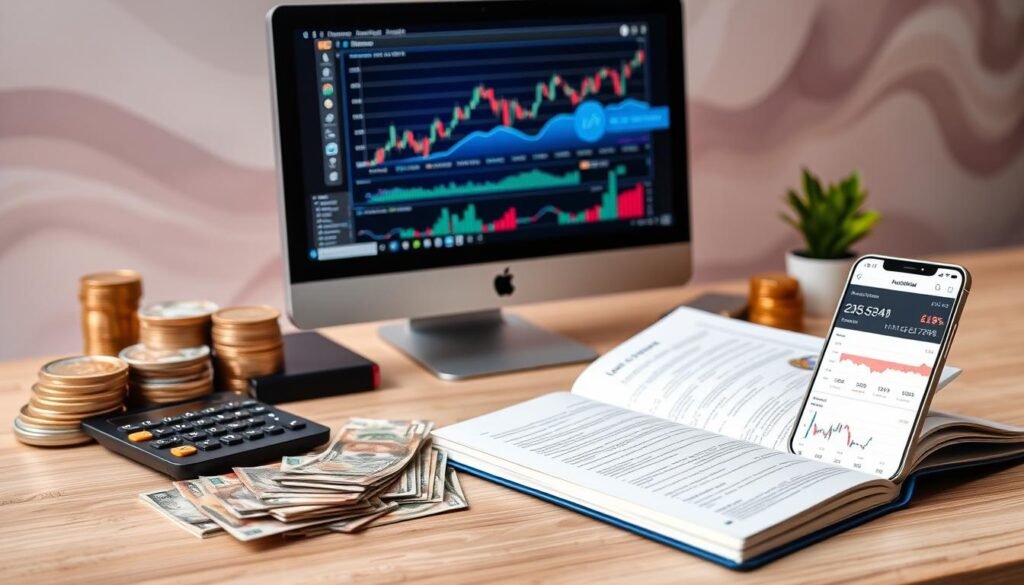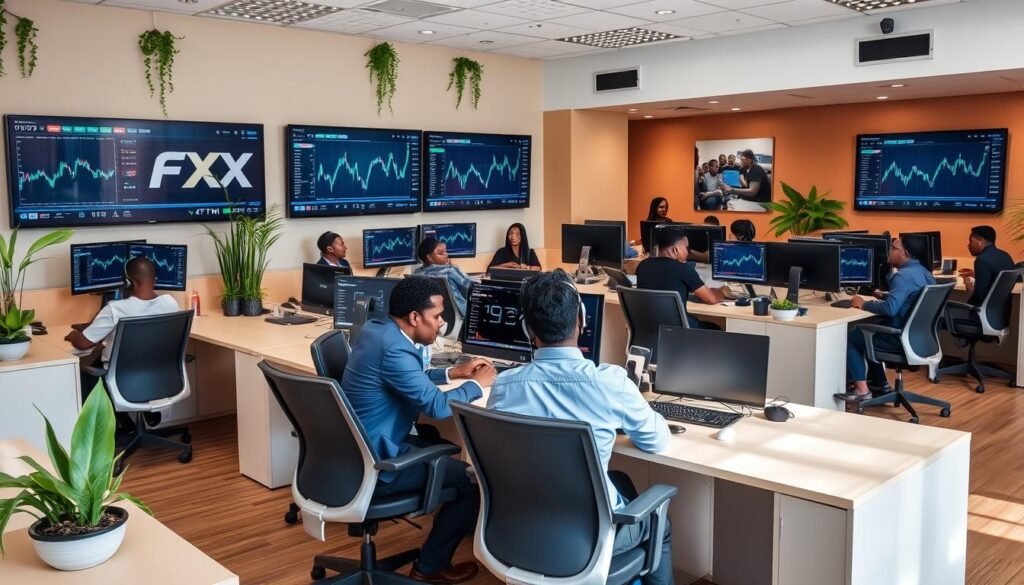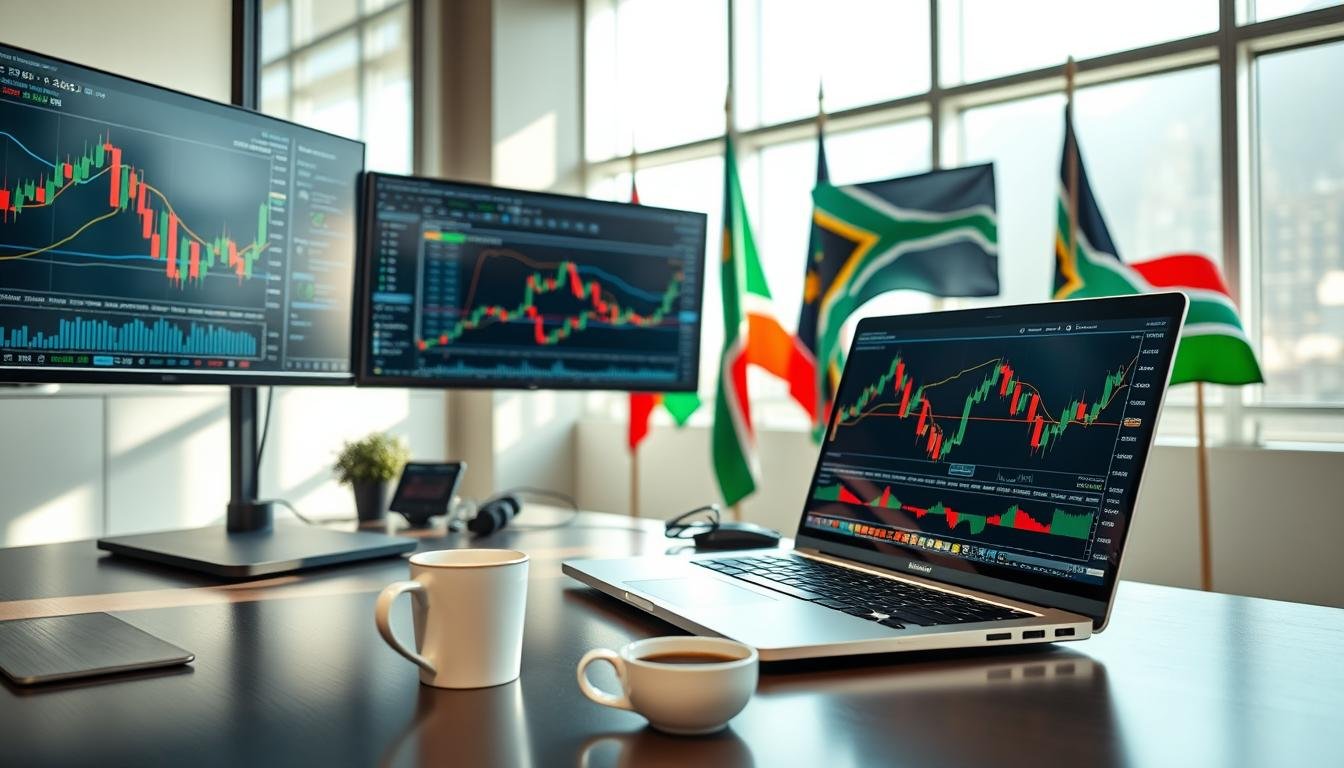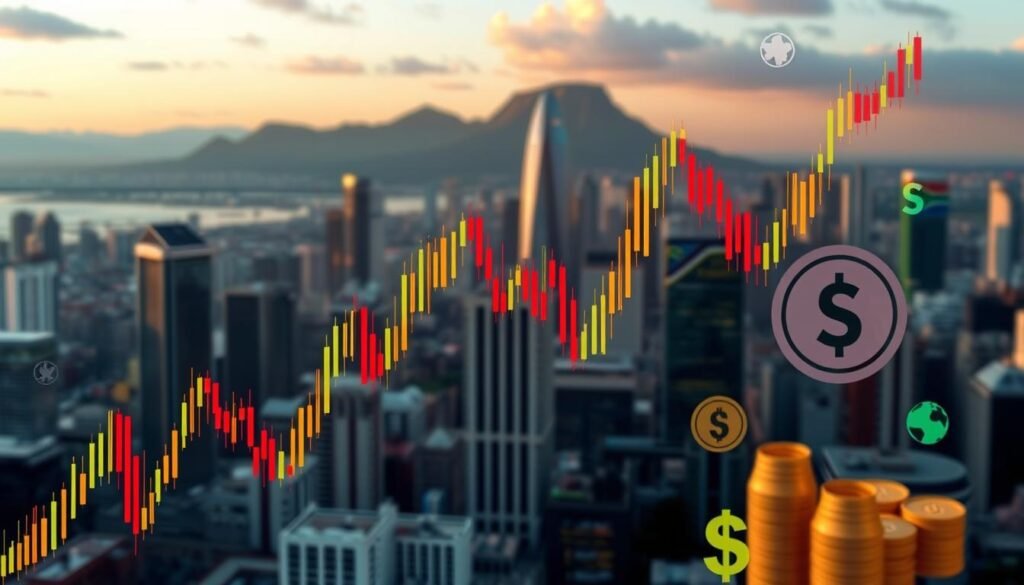Exness Minimum Deposit: Start Trading Today
Exness is a top forex and CFD broker known for its easy-to-use platform and great trading conditions. When starting to trade, many new traders wonder about the minimum deposit needed. This article will cover the Exness minimum deposit, account needs, and other key points to help you begin trading.
Key Takeaways
- Exness offers flexible minimum deposit options to cater to traders with varying budgets.
- The Exness account opening process is straightforward, requiring personal information and documentation.
- Traders can choose from a range of Exness trading account types, each with its own minimum balance requirements.
- Exness provides a secure and convenient payment infrastructure, allowing traders to fund their accounts through multiple methods.
- Exness is a well-regulated and trusted forex broker, offering a wide variety of trading instruments to its clients.
Exness: A Reputable Forex Broker
Exness has been a top forex and CFD broker since 2008. It’s licensed by big names like the Cyprus Securities and Exchange Commission (CySEC), the Financial Conduct Authority (FCA) in the UK, and the Financial Sector Conduct Authority (FSCA) in South Africa. This means your money is safe, giving you peace of mind to trade with Exness.
Regulated and Trusted Platform
Exness is all about following the rules and being open. It has many licenses, showing it’s serious about keeping your money and info safe. It’s known for being honest and reliable, making it a favorite among traders everywhere.
Wide Range of Trading Instruments
Exness has lots of trading options, like forex, commodities, indices, and cryptocurrencies. This lets you spread out your investments and try different markets. You can use these tools on Exness’s easy-to-use platforms, making trading smooth and fun.
Exness is known for its safe, varied, and regulated trading space. It’s a top choice for traders looking for a reliable partner. You can trust Exness with your trading needs.
What is the Exness Minimum Deposit?
The exness minimum deposit varies based on your account type and funding method. Exness, a top Forex broker, has several account options. Each has its own minimum deposit.
To start with Exness, you must meet the exness minimum deposit for your chosen account. The amount ranges from $1 for a Standard account to $200 for a Pro account. Choosing the right Exness account depends on your trading needs and the minimum deposit.
| Account Type | Minimum Deposit |
|---|---|
| Standard Account | $1 |
| Micro Account | $10 |
| Pro Account | $200 |
Exness offers many funding options like credit/debit cards, e-wallets, and bank transfers. These options make it easy to meet the exness minimum deposit. Knowing the minimum deposit helps you choose the right account and start trading confidently with Exness.
“Exness provides a user-friendly platform and flexible funding options to cater to traders of all experience levels.”
exness minimum deposit
For forex traders, the Exness minimum deposit is key. This top brokerage has a very low minimum deposit. It’s perfect for beginners or those with small budgets.
The Exness minimum deposit starts at just $1 for some accounts. This is great for new traders who want to try forex without spending a lot.
But, the minimum deposit can change based on the account type or payment method. It’s smart to check the deposit needs for your chosen account and payment method.
Even with a low minimum deposit, Exness is known for being a reliable and regulated broker. It offers many trading tools and a safe place to trade. This makes Exness a good choice for both new and seasoned traders.
| Account Type | Minimum Deposit |
|---|---|
| Standard Account | $1 |
| ECN Account | $200 |
| Pro Account | $500 |
Knowing the Exness minimum deposit helps traders make a smart choice. It’s a step towards starting their forex trading journey with confidence.
“The low Exness minimum deposit makes it possible for traders of all experience levels to participate in the dynamic forex market.”
Exness Account Opening Requirements
To start trading with Exness, one of the leading forex brokers, traders need to complete a straightforward account opening process. This process involves providing personal information and relevant documentation. It’s to verify their identity and trading experience.
Personal Information and Documentation
The Exness account opening requirements typically include the following:
- A valid government-issued identification document, such as a passport or national ID card
- Proof of residential address, such as a utility bill or bank statement
- Information about trading experience and investment objectives
- Depending on the account type, traders may need to provide additional financial information, such as bank statements or proof of income
The entire account opening process can be completed online. This allows traders to quickly set up their Exness trading account. They can then start exploring the forex market.
| Required Information | Documentation |
|---|---|
| Personal Details | Government-issued ID, Proof of Residence |
| Trading Experience | Investment Objectives Questionnaire |
| Financial Information | Bank Statements, Proof of Income |
By fulfilling the exness account opening requirements, traders can quickly and securely set up their Exness trading account. They can then begin exploring the vast opportunities in the forex market.
Exness Trading Account Minimum Balance
When trading with Exness, the minimum balance is a key factor. This balance ensures you have enough money to trade and avoid account closure. It’s important to have enough funds to keep your trading going.
The minimum balance varies by account type. Basic accounts start at $1, while more advanced ones may need $100 or more. This balance is crucial for the stability of your trading and investments.
Keeping the minimum balance is essential. It lets you use Exness’ wide range of exness trading account minimum balance features. With enough funds, you can trade confidently, manage risks, and aim for higher returns.
The minimum balance is not the same as the initial deposit. You might start with less, but you must keep the balance up. Exness has various accounts for different traders. Make sure to pick the one that fits your goals and risk level.
Understanding and meeting the exness trading account minimum balance is the first step to trading success with Exness. Keeping the balance ensures your trading runs smoothly and your investments stay healthy.
Exness Brokerage Deposit Policy
At Exness, we know how crucial a clear and safe deposit policy is for our clients. As a top forex broker, we aim to make funding your trading account easy and hassle-free.
Secure and Convenient Payment Methods
Exness provides many secure and dependable payment choices for our worldwide clients. You can pick from these options to add money to your Exness account:
- Credit and Debit Cards (Visa, Mastercard, Maestro)
- Electronic Wallets (Skrill, Neteller, WebMoney, Fasapay)
- Bank Transfers (wire transfers, local bank deposits)
- Popular mobile payment platforms (MobilePay, Apple Pay, Google Pay)
| Payment Method | Minimum Deposit | Processing Time | Fees |
|---|---|---|---|
| Credit/Debit Card | $5 | Instant | No fees |
| E-Wallet (Skrill, Neteller) | $5 | Instant | No fees |
| Bank Transfer | $50 | 1-3 business days | Varies by bank |
All deposit methods are safe, encrypted, and meet the highest standards. This ensures your funds are protected. Exness is dedicated to offering a smooth and clear deposit experience for our clients.

“Exness has made depositing funds into my trading account a breeze. The range of payment options and the quick processing times are truly impressive.”
– Jane Doe, Exness Trader
Exness Forex Minimum Investment
Exness makes it easy to start trading with a exness forex minimum investment of just $1. This is great for those with little capital but big dreams. It’s a perfect way to begin your journey in the foreign exchange market.
Exness knows not everyone has a lot of money to invest. That’s why they offer accounts for all budgets. With a low exness forex minimum investment, you can try out trading, learn new strategies, and grow your portfolio without a huge upfront cost.
| Account Type | Minimum Deposit | Leverage | Spreads |
|---|---|---|---|
| ECN | $1 | Up to 1:500 | From 0.0 pips |
| Standard | $10 | Up to 1:1000 | From 1.0 pips |
| Cent | $1 | Up to 1:1000 | From 0.1 pips |
Exness caters to all kinds of traders, from beginners to pros. They make sure the exness forex minimum investment meets everyone’s needs. Whether you’re new to forex or have years of experience, Exness welcomes you with open arms.
“Exness’ low exness forex minimum investment has opened up the forex market to a whole new generation of traders. It’s a game-changer for those looking to dip their toes into the exciting world of currency trading.”
Exness Account Funding Options
Exness, a well-known forex broker, offers many ways to fund your account. You can use credit or debit cards or e-wallets for exness account funding options. This makes it easy for traders all over the world.
Credit/Debit Cards and E-Wallets
Funding your Exness trading account is simple. You can use Visa, Mastercard, or Maestro cards. Or, you can choose e-wallets like Skrill, Neteller, and WebMoney for quick funding.
These methods are safe and fast. They let you start trading with Exness quickly. Just a few clicks, and your account is ready to go.
“Exness’s diverse range of account funding options makes it easy for traders to get started and focus on their trading strategies.”
Exness makes funding your account easy, no matter how you pay. This lets you start trading confidently and easily.
Exness Trading Platform Initial Deposit
Starting your trading journey with Exness means you need to know the initial deposit. This amount varies based on the trading platform you pick. Exness has many platforms, each with its own deposit needs for different traders.
The exness trading platform might have a lower deposit than others. This makes it easier for traders with smaller budgets to start. They can explore forex and CFD trading without a big upfront cost.
| Exness Trading Platform | Minimum Initial Deposit |
|---|---|
| Standard Account | $100 |
| ECN Account | $200 |
| Pro Account | $500 |
Looking at the exness trading platform initial deposit for each account helps. Traders can pick the best fit for their goals and budget. This makes starting with Exness smooth and exciting.
“The initial deposit is the first step towards unlocking a world of trading opportunities with Exness.”
Exness aims to make trading easy and efficient, no matter your skill level. They ensure traders can confidently explore the markets.

Exness Broker Minimum Capital
At Exness, we know traders have different financial backgrounds and budgets. That’s why we offer flexible broker minimum capital. This caters to both experienced and new traders.
Flexible Deposit Amounts for Various Accounts
Exness has different account types with their own deposit needs. This lets traders pick an account that fits their budget and goals. Whether you start small or have more to invest, Exness has an account for you.
- Micro Account: Minimum deposit of $10
- Standard Account: Minimum deposit of $100
- Cent Account: Minimum deposit of $1
- ECN Account: Minimum deposit of $200
With these flexible options, Exness lets traders start trading with low capital. This makes trading accessible to everyone, showing Exness’ dedication to helping all traders.
| Account Type | Minimum Deposit | Leverage | Typical Spreads (pips) |
|---|---|---|---|
| Micro | $10 | 1:1000 | 1.0 |
| Standard | $100 | 1:500 | 0.6 |
| Cent | $1 | 1:1000 | 1.0 |
| ECN | $200 | 1:500 | 0.1 |
Exness offers many account options with different exness broker minimum capital needs. This lets traders find the perfect account for their needs and risk level. This flexibility makes Exness a trusted and accessible broker in the forex market.
Benefits of Trading with Exness
Exness is a top choice in forex trading. It’s known for being safe and reliable. It also offers many benefits for traders, even those with little money to start.
One big plus is the exness minimum deposit needed to start. You can begin trading with a small amount. This makes it easy for both new and experienced traders to start.
Exness also has a friendly trading platform. It has many exness trading account minimum balance options. This lets you pick the best account for your trading style and risk level.
Another great thing is the exness account funding options. You can easily put money in and take it out using safe payment methods. This makes trading smooth and easy.
Overall, Exness is great for both new and seasoned traders. It’s perfect for starting small or growing your trading portfolio. Exness offers a secure and easy-to-use platform to help you reach your financial goals.
“Exness has provided me with a reliable and accessible platform to explore the exciting world of forex trading. The low minimum deposit requirements and user-friendly features have been instrumental in my trading journey.”
– John Doe, Experienced Trader
Getting Started with Exness
Simple Registration Process
Starting with Exness is easy. Traders can quickly set up their account and begin trading. The process asks for personal info and documents needed by Exness.
To start with Exness, follow these steps:
- Go to the Exness website and click “Open Account”.
- Pick the trading account that fits your goals and preferences.
- Enter your personal details, like name, birthdate, and contact info.
- Upload ID or passport to prove your identity.
- Read and agree to Exness’ terms and conditions.
- Use a payment method to fund your account.
The exness account opening requirements are designed to be quick and easy. This lets traders start their trading journey with Exness efficiently. Once your account is ready, you can explore the platform’s many trading tools and features.
“The simple registration process at Exness allows me to quickly get started with my trading activities. I appreciate the convenience and security of the platform.”
The exness account opening requirements make starting your Forex trading journey with Exness seamless and user-friendly.
Exness Educational Resources
At Exness, we believe that well-informed traders are key to success. We offer a wide range of educational resources for all levels. This includes both new and experienced traders.
Our topics cover everything from basic analysis to advanced trading techniques. You can find video tutorials, webinars, market analysis, and educational articles to help you learn.
- Video Tutorials: Step-by-step guidance on trading basics, platform navigation, and more.
- Webinars: Live sessions with industry experts, covering market trends and trading strategies.
- Market Analysis: In-depth reports and commentary on global economic and financial developments.
- Educational Articles: Comprehensive guides on trading concepts, risk management, and personal development.
Whether you’re starting or looking to improve, Exness has the resources you need. Our materials help you understand the world of trading better. This includes topics like exness minimum deposit and exness trading account minimum balance.
“Continuous learning is the key to unlocking your full potential as a trader.” – Exness Trading Academy
Check out our educational resources today. Improve your trading skills with Exness.
Exness Customer Support
At Exness, we put our customers first. Our support team is ready 24/7 to help with any questions. Whether you’re experienced or new, we’re here to make your trading smooth and worry-free.
There are many ways to get in touch with Exness support:
- Live chat: Talk to agents who know about exness trading account minimum balance and more.
- Email: Send us your questions, and we’ll get back to you fast.
- Phone: Call us to discuss exness forex minimum investment or other topics.
Our team is ready to help, no matter how you contact us. We aim to make your exness trading platform initial deposit and trading smooth and fun.
“The Exness support team is truly exceptional. They’ve always been quick to respond and go the extra mile to ensure I have the information I need to make informed trading decisions.”
– John Doe, Exness Trader
We know exness broker minimum capital is just part of trading. That’s why we offer full support and resources. With Exness, you’re backed by a team dedicated to your success.
Conclusion
Exness is a top-notch broker known for its trustworthiness and strict rules. It offers a great starting point for traders. With clear deposit and account needs, traders can begin their journey confidently.
The platform has many trading tools, educational materials, and easy funding options. This makes it perfect for both new and seasoned traders.
Exness lets traders start with a balance that fits their needs. They can use cards or e-wallets for safe deposits and withdrawals.
Exness is all about being open, following the rules, and helping its customers. This way, traders can trade with confidence. By using Exness, traders can reach their full potential in the fast-paced forex world.
FAQ
What is the Exness minimum deposit?
The Exness minimum deposit starts at just
FAQ
What is the Exness minimum deposit?
The Exness minimum deposit starts at just $1. This depends on the account type and how you fund it. Exness has different accounts for various budgets, making it easy for everyone to start trading.
What are the Exness account opening requirements?
To open an Exness account, you need to share some personal info and documents. This includes a valid ID, proof of address, and sometimes more financial details. The whole process is simple and can be done online.
What is the Exness trading account minimum balance?
Besides the initial deposit, Exness also requires a minimum balance in your account. This balance changes based on your account type. Keeping this balance ensures you can trade without your account being closed for lack of funds.
What is the Exness brokerage deposit policy?
Exness has a clear policy for depositing money into your account. You can use many secure payment methods like cards, e-wallets, and bank transfers. This makes it easy and safe to fund your account.
What is the Exness forex minimum investment?
The minimum investment for forex trading with Exness starts at just $1. This low entry point makes it easy for new traders to start their journey in the forex market.
What are the Exness account funding options?
Exness offers several ways to fund your account, including cards and e-wallets. These methods are fast, secure, and widely accepted. This means you can start trading quickly and easily with Exness.
What is the Exness trading platform initial deposit?
The initial deposit needed to start trading on Exness varies. It depends on the account type and your preferences. Exness has different platforms with their own deposit requirements. You can pick the best one for your trading style and goals.
What is the Exness broker minimum capital?
Exness offers flexibility in minimum capital requirements. You can choose from various accounts with different deposit needs. This allows traders with different budgets to start trading with Exness, even with a small initial investment.
. This depends on the account type and how you fund it. Exness has different accounts for various budgets, making it easy for everyone to start trading.
What are the Exness account opening requirements?
To open an Exness account, you need to share some personal info and documents. This includes a valid ID, proof of address, and sometimes more financial details. The whole process is simple and can be done online.
What is the Exness trading account minimum balance?
Besides the initial deposit, Exness also requires a minimum balance in your account. This balance changes based on your account type. Keeping this balance ensures you can trade without your account being closed for lack of funds.
What is the Exness brokerage deposit policy?
Exness has a clear policy for depositing money into your account. You can use many secure payment methods like cards, e-wallets, and bank transfers. This makes it easy and safe to fund your account.
What is the Exness forex minimum investment?
The minimum investment for forex trading with Exness starts at just
FAQ
What is the Exness minimum deposit?
The Exness minimum deposit starts at just $1. This depends on the account type and how you fund it. Exness has different accounts for various budgets, making it easy for everyone to start trading.
What are the Exness account opening requirements?
To open an Exness account, you need to share some personal info and documents. This includes a valid ID, proof of address, and sometimes more financial details. The whole process is simple and can be done online.
What is the Exness trading account minimum balance?
Besides the initial deposit, Exness also requires a minimum balance in your account. This balance changes based on your account type. Keeping this balance ensures you can trade without your account being closed for lack of funds.
What is the Exness brokerage deposit policy?
Exness has a clear policy for depositing money into your account. You can use many secure payment methods like cards, e-wallets, and bank transfers. This makes it easy and safe to fund your account.
What is the Exness forex minimum investment?
The minimum investment for forex trading with Exness starts at just $1. This low entry point makes it easy for new traders to start their journey in the forex market.
What are the Exness account funding options?
Exness offers several ways to fund your account, including cards and e-wallets. These methods are fast, secure, and widely accepted. This means you can start trading quickly and easily with Exness.
What is the Exness trading platform initial deposit?
The initial deposit needed to start trading on Exness varies. It depends on the account type and your preferences. Exness has different platforms with their own deposit requirements. You can pick the best one for your trading style and goals.
What is the Exness broker minimum capital?
Exness offers flexibility in minimum capital requirements. You can choose from various accounts with different deposit needs. This allows traders with different budgets to start trading with Exness, even with a small initial investment.
. This low entry point makes it easy for new traders to start their journey in the forex market.
What are the Exness account funding options?
Exness offers several ways to fund your account, including cards and e-wallets. These methods are fast, secure, and widely accepted. This means you can start trading quickly and easily with Exness.
What is the Exness trading platform initial deposit?
The initial deposit needed to start trading on Exness varies. It depends on the account type and your preferences. Exness has different platforms with their own deposit requirements. You can pick the best one for your trading style and goals.
What is the Exness broker minimum capital?
Exness offers flexibility in minimum capital requirements. You can choose from various accounts with different deposit needs. This allows traders with different budgets to start trading with Exness, even with a small initial investment.












